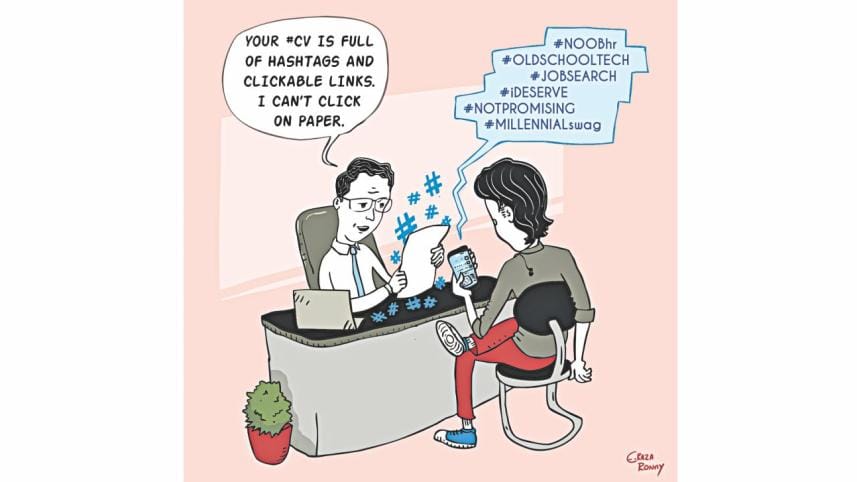THE MILLENNIAL WAY TO NAIL THAT JOB INTERVIEW

Millennials are often stereotyped for being too lazy, distracted, high-maintenance, tactless, whimsical, and self-centred. Most people assume that we only seek instant gratification. Despite these half-true stereotypes, even we need jobs, and proving the stereotypes right will do us no good. Under these circumstances, what are you, a frustrated and mistreated millennial, to do if you want to debunk these ideas as mere myths associated to your performance? Follow the tips in this article to make sure you don't get fired even before you get hired.
PRE-INTERVIEW
1. Do your homework on the company/employer
This is perhaps the most important part of your preparation. On the days before the interview, instead of just brooding nervously, find out everything about the company's history, its business model, and organisational structure. You'll find all the information you need just by googling. I know people who did excellent at aptitude tests but didn't get the job, because they didn't know anything about the company's operations. So you don't want to be thrown off guard if the first question they ask is something as rudimentary and at the same time as precise as what segment of people the company targets. Being knowledgeable about the company will give the impression that you're genuinely interested in the job and that you'll make a dedicated employee.
2. Set up a few mock interviews
If you have any acquaintances who have experience of working in your field, ask them to take a mock interview. Tell them to ask you as many difficult questions as possible, so that you get a taste of what's to come. Also get feedback from them afterwards. It's advisable to not have close family members or friends to take the mock interview, so that a certain level of objectivity and seriousness remain in the entire setting.
3. Refine your social media personality
Those "tryin 2 find da meaning of diZ lyfff…" status updates or "1 like = 1 tbh??" answers you had shared via ask.fm back in 2008 may not pose any threat. But wiping out the more generally considered controversial and sensitive content, for example posts containing political views, may be for the best.
DURING INTERVIEW
1. Nail the interview look
First impressions probably matter nowhere as much as they do in job interviews (except maybe in blind dates). The best way to hit the right balance is to put careful thought into how you dress. For the boys, it's best if you wear well-ironed, well-tailored formals, with the right shoes. Do not wear jeans, sandals, or polo shirts. Girls, keep your makeup and accessories as minimal as possible, and don't wear anything too flashy. A semi-dressy salwar kameez, or a suit is perfect for interviews. Whatever outfit you choose, just make sure that it's professional. Looking your best cannot come at the cost of being 5-10 minutes late to the interview. If you know it'll take time for you to get ready, wake up early. Your punctuality, attitude, smartness, and any behaviour that may suggest counter-productivity will be factors interviewers will keep a sharp eye on.
2. Impart the impression that you're ready
One bad millennial habit is job-hopping, so if possible, mention to the interviewer that you see a future for yourself in their company.
3. Less "I" more "YOU"
The interview may start off with the typical "Tell me a bit about yourself," but you have to understand the question for what it is. It is not an open invitation to delve into minuscule details about what exactly makes you passionate about your work or an elaborate account of your hopes and dreams. Yes, an interview is a platform to present your dexterities, but it's really about which among those would be of best use to the job. So illustrate how you can contribute to the company's well-being and sustainability.
4. Blatant red flags you need to steer clear of
The many common mistakes marring an interview experience for either parties ranges from forgetting the hiring managers'/interviewers' names, interrupting them, getting too personal with them, stopping the interview ahead of time, and other obvious things like: using a cellphone during an interview or attending to anything off the script without asking for the other party's permission.
POST-INTERVIEW
1. Ask the relevant questions
Rather than keeping quiet and waiting to get done with the interview, you may inquire the interviewers about any aspect of the job that has been skipped during the interview, or that you think needs clarification.
2. Keep faith in yourself
While many are often hesitant to talk about their strengths and weaknesses, a bit of advertisement and candour is not only permissible, but necessary. Be confident and honest about both your abilities and inabilities. Try to highlight your unique points. Make it clear why you are the best choice for the job, and what sets you apart from the next person who comes along.
Generation and mentality gaps can drive your interviewers to generalise you to be narcissistic or self-interested. But it falls under your job description, beginning with your interview, to show them you have humility, and interests and concerns beyond your personal gains. Instead of getting demotivated on encountering stereotypical expectations, you could do yourself and your peers a lot of good by not reinforcing these notions, but rather proving them as fallacies.
Eshanee is a junior at IBA, DU. Reach her at eshanee333@gmail.com.



 For all latest news, follow The Daily Star's Google News channel.
For all latest news, follow The Daily Star's Google News channel.
Comments